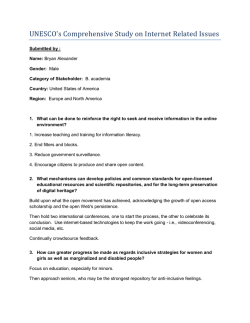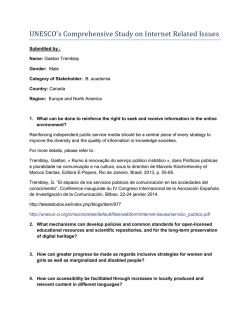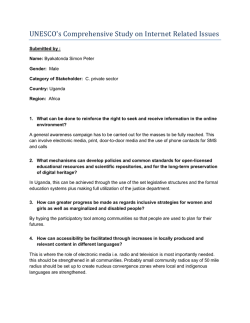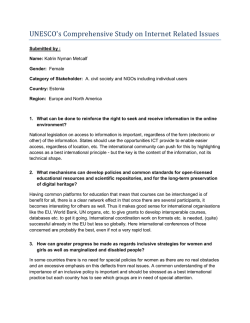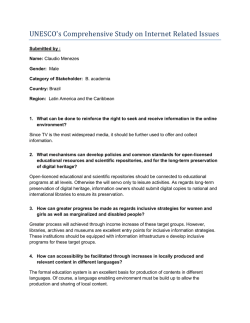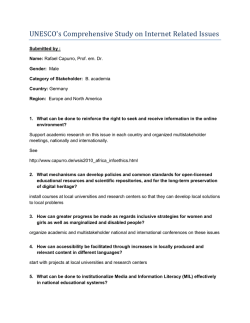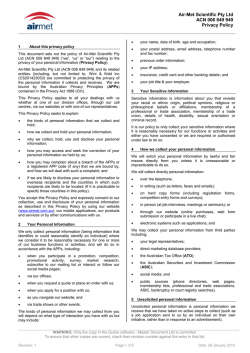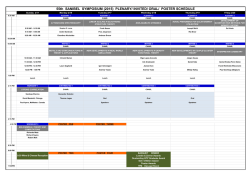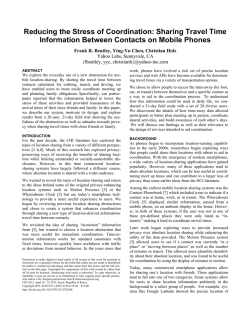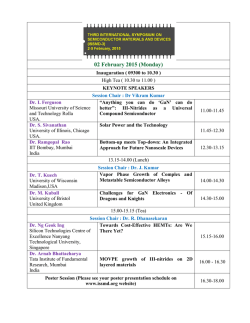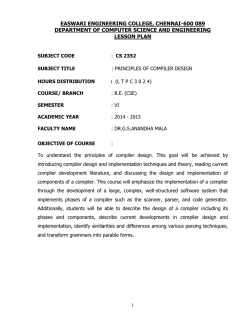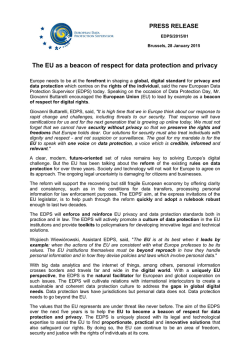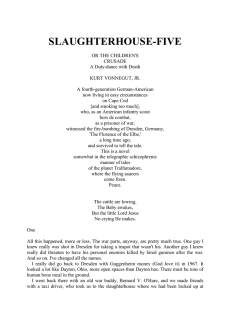
cfaed.tu-dresden.de - Faculty of Computer Science
cfaed INAUGURAL Wednesday, 28 January 2015 — 16:30-17:30 Room E023 — Andreas-Pfitzmann-Bau (APB) TU Dresden, Nöthnitzer Str. 46, 01187 Dresden PROF. THORSTEN STRUFE TU Dresden, Faculty of Computer Science, Chair for Privacy and Security “Privacy vs. Surveillance and Censorship in Online Services” Freedom of speech, the paramount prerequisite for democracies, requires the ability to freely research and retrieve various information, as well as the ability to develop and express opinions without the fear of tracing, retribution, or even just ridicule. On this year’s international Data Privacy Day, I want to shed a light on the current situation of the freedom of speech, censorship, and surveillance within common online services. In spite of the rather pessimistic state I will introduce ongoing and future activities of the Privacy and Security group, ranging from network security over darknets to privacy preserving cloud services, which aim at helping to regain privacy, censorship-resistance, and control over personal information. Thorsten Strufe is professor for Privacy and Security at Technische Universität Dresden. His research interests lie in the areas of privacy and resilience, especially in the context of social networking and cloud services. Recently, he has focused on studying user behavior and security in online social networks and possibilities to provide privacy-preserving and secure social networking services and big data Solutions. He was appointed professor for Peer-to-Peer networks at Technische Universität Darmstadt, Germany, from 2009 to 2014, and visiting professor for Dependable Distributed Systems at University of Mannheim, Germany, throughout 2011. Previously, he took posts as senior researcher at EURECOM and at TU Ilmenau, working on analysis and the security of online social networks, as well as resilient networking. He received his PhD degree from TU Ilmenau in 2007. His PhD thesis deals with the construction of censorship resistant and network efficient overlay topologies for live multimedia streaming, and means to making them especially resilient towards both the failure of nodes and DoS attacks. PROF. JERONIMO CASTRILLON TU Dresden, Faculty of Computer Science, cfaed Chair for Compiler Construction “Compilers for Multi and Many Processor Systems” Without compilers producing machine code from high-level, human-readable programming languages it is difficult to imagine the huge amount of software content that surrounds our day-to-day life. Compilers have been around for more than 50 years, with major breakthroughs in the 60s-80s followed by improvements to try to catch up with new clever hardware features brought by computer architects. This incremental improvement, for many unnoticeable, reached a turning point around ten years ago with the switch to multi and many core architectures. In this presentation I discuss some of the compiler challenges posed by parallel systems and give insight into the research topics and interests of the Cfaed Chair for Compiler Construction. The talk will address the issue of extracting parallelism from existing legacy sequential code as well as the issue of providing better abstractions and optimizations for new programming models. Jeronimo Castrillon received the Electronics Engineering degree with honors from the Pontificia Bolivariana University in Colombia in 2004, the master degree from the ALaRI Institute in Switzerland in 2006 and the Ph.D. degree (Dr.-Ing.) on Electric Engineering and Information Technology with honors from the RWTH Aachen University in Germany in 2013. From early 2009 to April 2013 Dr. Castrillon was the chief engineer of the chair for Software for Systems on Silicon at the RWTH Aachen University. In June 2014, Dr. Castrillon joined the department of computer science of the TU Dresden as professor for compiler construction in the context of the German excellence cluster “Center for Advancing Electronics Dresden” (cfaed). His research interests lie in methodologies, languages, tools and algorithms for programming complex computing systems. Prof. Castrillon has several international publications and has served as program chair and technical program committee in international workshops and conferences (e.g., EUC, MCSoC, Vipes and Rapido). He is the recipient of numerous awards, including the Swiss Excellence Government Scholarship in 2005 and the Intel Doctoral Award in 2012. In late 2014 he co-founded Silexica Software Solutions GmbH, a startup that provides programming tools for embedded multicore architectures. The inaugural lectures will be followed by a small reception. cfaed.tu-dresden.de
© Copyright 2026
